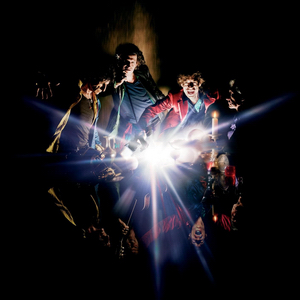 After Bridges to Babylon, the Stones became an almost endless touring machine. In 1998 they released the live No Security album, and followed that up with a double CD Live Licks in 2004. They also started repackaging their older material. The singles from their early years until 1971 were issued as multi-CD sets replicating the original vinyl releases, and the compilation Forty Licks was the first career-spanning set the Stones had ever released and included four new songs that don’t belong within a mile of a best of The Rolling Stones.
After Bridges to Babylon, the Stones became an almost endless touring machine. In 1998 they released the live No Security album, and followed that up with a double CD Live Licks in 2004. They also started repackaging their older material. The singles from their early years until 1971 were issued as multi-CD sets replicating the original vinyl releases, and the compilation Forty Licks was the first career-spanning set the Stones had ever released and included four new songs that don’t belong within a mile of a best of The Rolling Stones.
The longest the Stones had ever gone without releasing an album was the four years between Steel Wheels and Voodoo Lounge. But now, raking in the bucks as a touring jukebox, regurgitating old songs and performances from new tours as product, it seemed like the band had run out of gas as a creative unit. It took eight years for the Stones to release the follow-up to Bridges to Babylon, and it was what many assumed would be their recorded swan song.
To say that A Bigger Bang fails to live up to vintage Stones albums like Sticky Fingers or Exile On Main Street is an understatement. Nevertheless, the intention of the album was to strip away a lot of the excess that had been part of the band’s sound and get back to basics. Mick Jagger and Keith Richards collaborated more closely than they had in years, writing the songs while Charlie Watts was battling throat cancer. The horn players and backing vocalists (with the exception of multi-talented Blondie Chaplin, who appears on only two songs) were absent, leaving only Chuck Leavell’s organ and Daryl Jones’s bass as the only prominent instruments outside the core of the band.
The result was that this was the most stripped down album they’d released in decades. You’ve got to go back to Some Girls and Emotional Rescue to find the Stones this scaled back. This is their version of the Beatles’ Get Back concept and the good news is that a very large part of it is successful. The album was widely praised, probably over-praised, when it was released. It was hailed as a complete return to form by critics.
It’s not a complete return to form. As raw as the band sounds, the production is still somewhat glossy, and there are a couple of songs that miss their mark as much as anything they ever did. It lacks the sonic experimentation of albums like Undercover and Bridges to Babylon, preferring to be as close as the 2005 Rolling Stones could get to a White Stripes album (i.e., not really all that close). At over 64 minutes, it’s just a shade shorter than Exile on Main Street, which would make this another double album that should have been a single (see also Voodoo Lounge).
The album kicks off with a pummeling rocker called “Rough Justice”, their best opening salvo since “Start Me Up”. This is the band playing like garage rockers, with vicious slide guitar from Ron Wood while Keith grinds out the rhythm guitar. Keith’s guitar has rarely sounded so distorted, and Charlie Watts barrels through the song like a steam train. Even Jagger is in fine form, kicking off the album with a fun play on words that could sound convincing coming only from him. He may have been in his early 60s when the band recorded the album, but Mick’s gonna Mick.
The intensity drops for the mid-tempo rockers “Let Me Down Slow” and “It Won’t Take Long”, but what a pleasure it is to hear Jagger singing lead and joined on the harmonies by Keith…and only Keith. Ron Wood plays a stinging slide solo on “Let Me Down” and offers supple rhythm support on “Long.” On both songs, Daryl Jones plays intricate bass lines that lock in nicely with the ever-reliable Charlie Watts. Of the two songs, “Let Me Down Slow” is the dirtier, raunchier effort. Charlie’s drums are too clean on “It Won’t Take Long” and the bass is lower in the mix.
The Stones step back into the Seventies with “Rain Fall Down,” a tough funk track that could have fit on Black and Blue or even It’s Only Rock & Roll. Jagger is in fine voice, tipping his hat to rap by singing most of the song in a speak/sing voice. Daryl Jones’s bass is more prominent in the mix, as befits a funk song, but the ending drags too long. It’s a very good song that would have benefited from some judicious pruning.
The tempos drop for the ballad “Streets of Love.” Jagger’s over-enunciating but the acoustic guitars from Wood and Richards are solid, weaving together and building to an anthemic, electric, chorus. Charlie’s playing is understated and subtle, wisely resisting the urge to overplay in that arena-ready chorus. Ron Wood plays a great solo, aided by Keith on acoustic and Jagger on electric guitar. Chuck Leavell’s piano provides a stately backdrop. However, once again the song is too long, suffering from the same bloat that dogged many of the band’s songs since Voodoo Lounge.
The same can not be said of the delightful “Back of My Hand.” Talk about getting back to your roots! With the exception of some B-sides like “Fancy Man Blues” or “Cook Cook Blues,” the Stones had largely relegated traditional blues to being a strong influence on their brand of rock and roll, but this is what God intended the Stones to sound like back in 1963 (and by God I mean Brian Jones). It isn’t too dissimilar to songs like “You Got to Move” (Sticky Fingers) or “Casino Boogie” (Exile). Charlie thumps like Meg White, Keef plays a terrific slide solo, and Jagger breaks out his best blues voice while also playing bass guitar and absolutely terrific harmonica. This is the Stones going so far back that even Ronnie Wood wasn’t invited tp appear on the track.
All of this makes the next track sound worse than it is. Once again it’s Mick on bass for “She Saw Me Coming” but the addition of Blondie Chaplin on backing vocals makes the difference between this song and most of the album very obvious. Suddenly the garage band album sounds very professional. Charlie’s great, of course, but the track with it’s shout along title refrain, is an otherwise unremarkable piece of album filler that would have been better off as a B-side or a track on some future rarities album.
This is the point where the wheels start to get a little wobbly on the album. “Biggest Mistake,” also without Ronnie’s input, is more filler. It’s not a bad track, but it’s forgettable. Jagger is again over-singing, and Chuck Leavell’s organ is so subtle it’s barely there which raises the question of why they would bother. Keith’s guitar is good, with Jagger providing the rhythm.
“This Place is Empty” is a Keith ballad, that sounds remarkably like every other Keith ballad since Dirty Work‘s “Sleep Tonight.” A dusky vocal from Keith, complete with cracked notes, is not helped by cringeworthy lyrics like “Come on and bare your breasts/And make me feel at home.” It’s yet more filler. In some ways it’s good that the band answered eight years of silence with a double LP’s worth of music, but this middle section drags the whole effort down and can easily be skipped to provide a better listening experience.
Fortunately the band recovers some of its mojo on “Oh No, Not You Again,” another rocker played by the core original band of Mick, Keith, and Charlie with some help from Daryl Jones on bass. The band sounds charged up again, like they’re having fun. The Stones always had a sense of humor and it comes through in the fun and funny lyrics here. Charlie swings and throws in great fills, and Keith plays a great guitar solo.
Jagger takes over bass duty on “Dangerous Beauty,” another track featuring only the original Stones. Over slashing guitar chords, Jagger shout sings the lyrics and there’s a nice, tight, guitar solo from Keith. It’s otherwise an unremarkable track that probably could have been left off without harming the listening experience. This is in contrast to “Laugh, I Nearly Died,” an intense torch song that bears a familial resemblance to “Always Suffering” from Bridges to Babylon, but with much better production. Jagger’s vocals are layered, including a falsetto in the harmony, culminating in an a capella climax of multi-tracked voices.
“Sweet Neo Con.” Then there’s this mess. Lyrically it’s a mash note to Condoleeza Rice, but the song’s an embarrassment. Musically it’s uninteresting. Keith is credited with guitar but he apparently wanted little to do with the song. Although he stood by Jagger’s desire to make a political statement, he also called it “cheap publicity” adding, correctly, “Nobody will know what it means in 10 years.” Charlie shows up for work and lays down a click track-worthy drum pattern. Lyrically it’s atrocious, managing to rhyme “certain” with “Halliburton” and even Jagger seems like he’s ashamed of what he’s singing. “Sweet Neo Con” is one of the most embarrassingly bad songs the Stones have ever done, and have I mentioned that this is the band that recorded “Gomper”?
Things pick up considerably with “Look What the Cat Dragged In,” a solid rocker. Ronnie Wood is back and plays a ferociously great guitar solo. Lyrically there’s even a really cryptic shout out to the Beatles with the lines “You look like a fucker, Sergeant Pepper/Are you going to throw up all over my face?” Hey, I didn’t say it was a good lyric.
One of the best songs on the album is hidden here, near the end. “Driving Too Fast” should have become a live favorite. Jagger sounds great, and Charlie swings like a beast. Chuck Leavell is again on piano and again barely audible. Ronnie and Keith play powerful rock and roll guitars, and the whole thing steams along like a Ferrari on the Autobahn.
Keith again closes the ceremonies, for the fourth time in five albums, with “Infamy”, but at least it’s not one of his typically sleepy ballads. It’s a mid-tempo number with a nice pun in the lyrics (“you got in infamy”). For the second time on the album, Blondie Chaplin sings backing vocals and makes the track sound more like a Keith solo song. Keith’s voice is more convincing on the uptempo numbers than on the ballads these days when the flaws in his cigarette/booze/drug-addled throat stand out.
A Bigger Bang is the album that sounds the most like the Rolling Stones since the Eighties. Much of it was recorded live as a trio with Keith, Mick, and Charlie. Overdubs were done later and the songs were fleshed out. Ronnie Wood appears on only nine tracks, roughly half the album, one song fewer than Daryl Jones on bass. For the first time in a long time, the remaining original members play on every song, supporting each other as they’re supposed to do. That gives the album more of a band feeling than anything they’ve done since when? Dirty Work? Undercover? Tattoo You, maybe?.
There are issues with the album. It was over-hyped on release because it starts so well and ends so well, but the middle of the album is clogged with filler and “Sweet Neo Con” should have never been recorded. Once again the Stones are victims of excess. Cut the filler, shorten a couple of songs, banish “Neo Con” into the cornfield and A Bigger Bang is the best album they’ve done in a very long time.
Grade: B
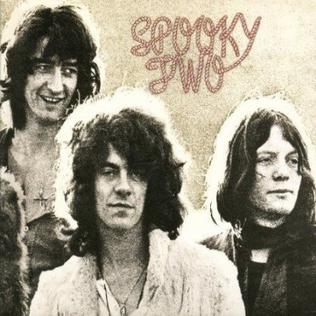 A simple drum beat opens the festivities here, accompanied by various grunts from the singer who’s warming up in the wings, before the incredibly loud, magisterial organ comes in. Spooky Tooth has arrived and, with them, the beginnings of the Progressive Rock movement that would flower in the following years.
A simple drum beat opens the festivities here, accompanied by various grunts from the singer who’s warming up in the wings, before the incredibly loud, magisterial organ comes in. Spooky Tooth has arrived and, with them, the beginnings of the Progressive Rock movement that would flower in the following years.
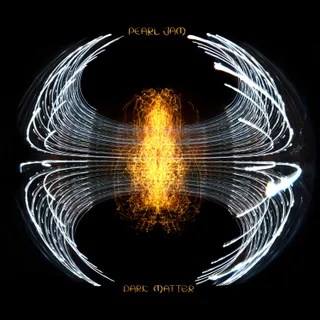
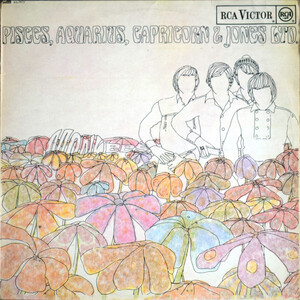 It’s an easy mistake to make, to judge The Monkees by their hit singles without ever diving any deeper. After all, it’s not like they were a real band driven to make artistic statements over the course of an LP. But easy or not, it’s a mistake. In fact, the Monkees albums are a virtual treasure trove of potential hits; with a band constructed to be a hit machine, virtually all of the songs that were given to them were viewed as potential singles, and the songs written by the band members were their attempts to break the stranglehold the producers held over their product.
It’s an easy mistake to make, to judge The Monkees by their hit singles without ever diving any deeper. After all, it’s not like they were a real band driven to make artistic statements over the course of an LP. But easy or not, it’s a mistake. In fact, the Monkees albums are a virtual treasure trove of potential hits; with a band constructed to be a hit machine, virtually all of the songs that were given to them were viewed as potential singles, and the songs written by the band members were their attempts to break the stranglehold the producers held over their product.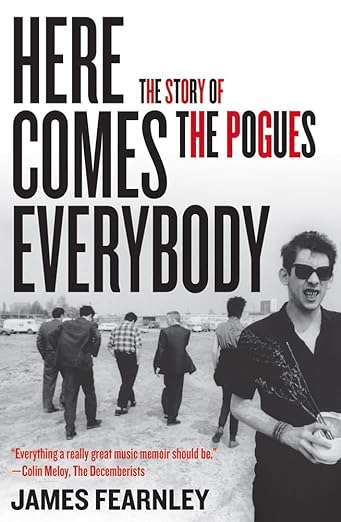 Dissolution never sounded better than The Pogues. It seems almost churlish to ask how good the band would have been if they had tempered their wildly self-destructive tendencies and concentrated on the music. In his new memoir, Pogues accordionist and multi-instrumentalist James Fearnley asks the question whether it was Shane MacGowan’s headlong pursuit of oblivion that made him such a great artist. He doesn’t answer because there is no answer. Shane MacGowan was who he was, and never changed. The fact that he made it to the age of 65 before succumbing to his lifestyle is testament to the man’s constitution.
Dissolution never sounded better than The Pogues. It seems almost churlish to ask how good the band would have been if they had tempered their wildly self-destructive tendencies and concentrated on the music. In his new memoir, Pogues accordionist and multi-instrumentalist James Fearnley asks the question whether it was Shane MacGowan’s headlong pursuit of oblivion that made him such a great artist. He doesn’t answer because there is no answer. Shane MacGowan was who he was, and never changed. The fact that he made it to the age of 65 before succumbing to his lifestyle is testament to the man’s constitution.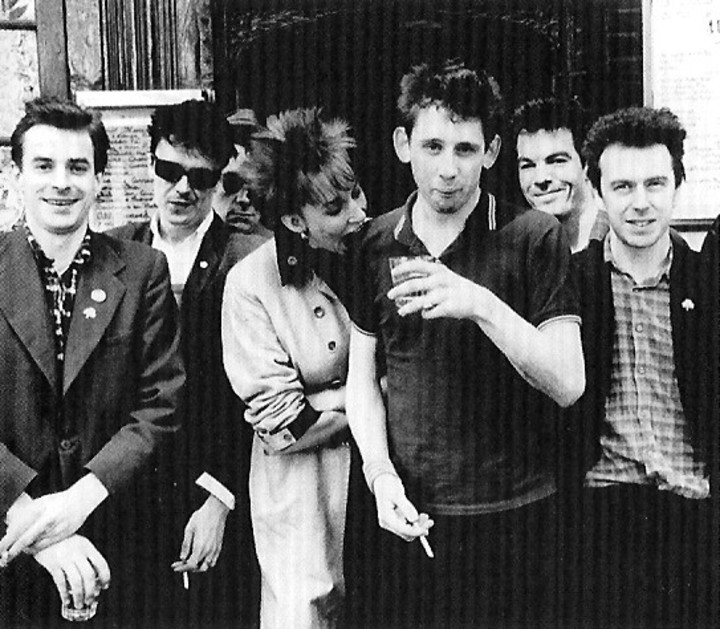
 After Bridges to Babylon, the Stones became an almost endless touring machine. In 1998 they released the live No Security album, and followed that up with a double CD Live Licks in 2004. They also started repackaging their older material. The singles from their early years until 1971 were issued as multi-CD sets replicating the original vinyl releases, and the compilation Forty Licks was the first career-spanning set the Stones had ever released and included four new songs that don’t belong within a mile of a best of The Rolling Stones.
After Bridges to Babylon, the Stones became an almost endless touring machine. In 1998 they released the live No Security album, and followed that up with a double CD Live Licks in 2004. They also started repackaging their older material. The singles from their early years until 1971 were issued as multi-CD sets replicating the original vinyl releases, and the compilation Forty Licks was the first career-spanning set the Stones had ever released and included four new songs that don’t belong within a mile of a best of The Rolling Stones.